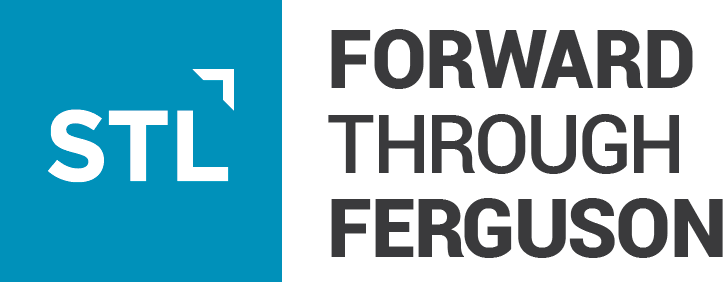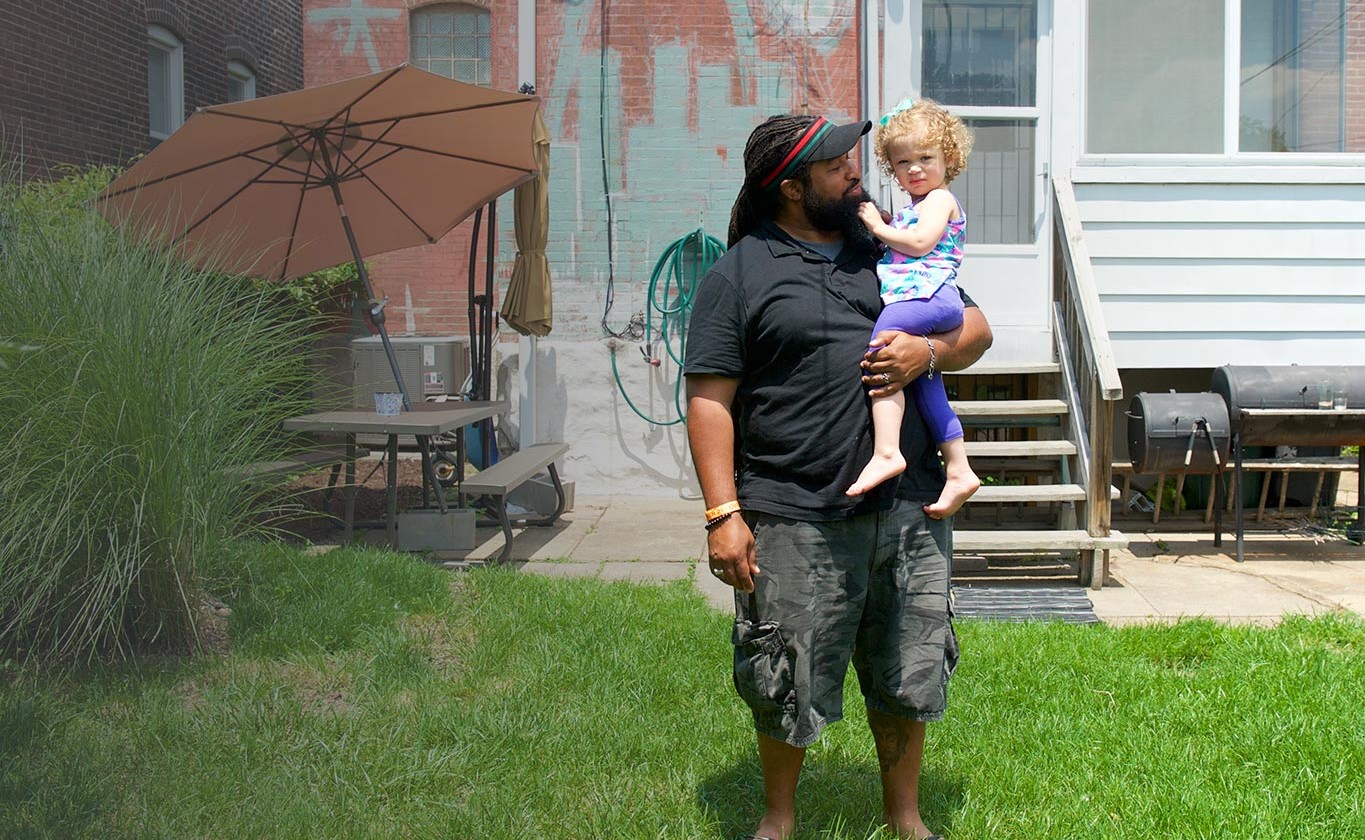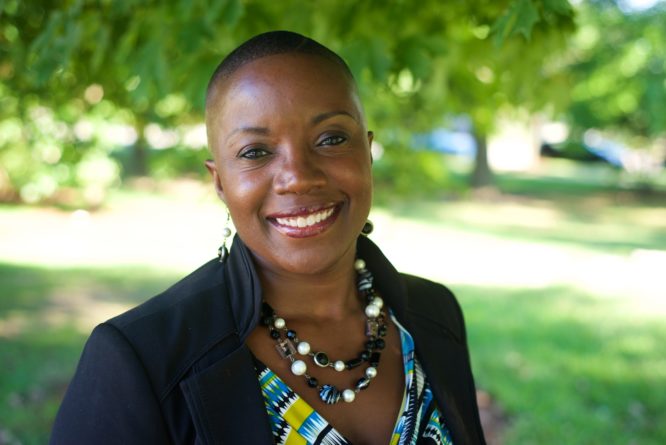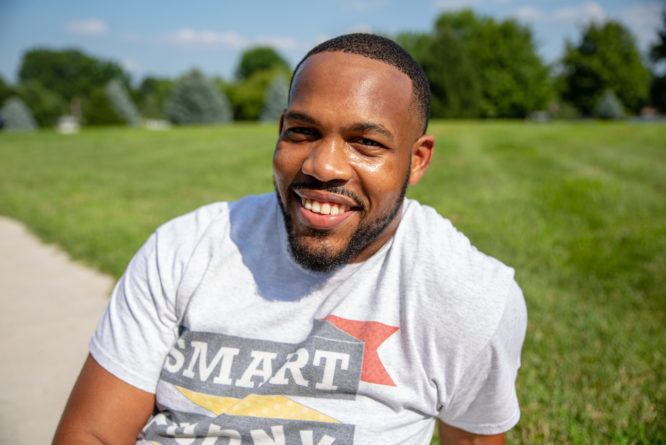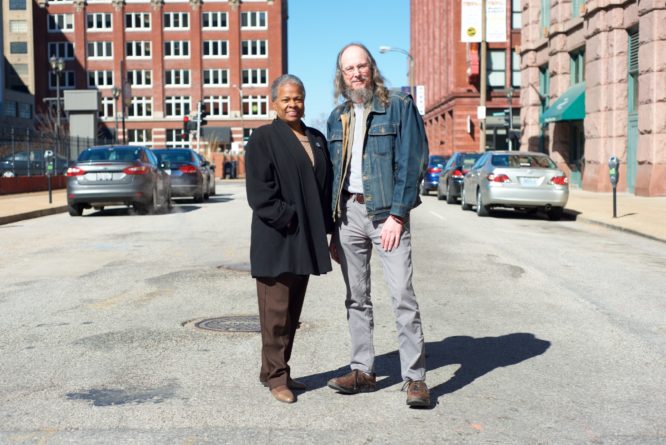The hardest hat for me to wear has been as a Black man who is a father to a biracial daughter in a relationship with a White woman, who is also involved in social justice advocacy in our community, and at times feeling that even though I know this is about a lot of things including racism, in some ways I can’t speak to some of the challenges that I personally faced. When everything was going on, it was so close to my house. When I’m taking care of my daughter because my partner is out at one of the safe zones on SLU’s campus — one of the safe places for people to talk, and share, and be present — and these fools are setting garbage cans on fire across the street from my house, what does that have to do with making a point? Putting my family in jeopardy — that was hard for me. That was really hard for me.
Some of the questions people outside of St. Louis want to ask are: “Is it a war zone? Is it as bad as it’s being depicted on television? Are you fearful? What is it like for your family?” The reality is that I’m 17 minutes from Ferguson. It’s not close. Clayton is closer. And living in the city proper creates its own challenges. So I’ve just tried to help people understand that it’s bad and there are opportunities for all of us to think about what role we might be playing in contributing to some of the problems in society. Because with all the talking heads and the media, everybody’s got an opinion. Everybody’s got a perspective. And the more time we spend on that, the less time we spend trying to figure out what we can be doing differently. How do I look at my own life? My own interactions with people in my community? White people and people of color, racism isn’t just something that impacts Black people. It impacts everybody. And we all in some ways suffer the consequences of racism when we don’t think about our own socialization.
What do you say to that audience that says, “Yeah, I know there’s something going on, but I’m not affected” or “I’ve chosen not to be part of it”?
I wish that was an easy question to answer. As much as we know from being involved in the community, being involved in Ferguson, and just trying to be engaged, it’s hard to think there are people who can disconnect from it who live in our community. But there are many things that I disconnect from in our community that equally happen to other people. Murder happens all the time. Poverty happens all the time. Our public school systems are horrible. Not all of them. There are some great teachers in a lot of these establishments. But the systems are not set up for the majority of kids to succeed. So how do people help me understand that’s something I should be fighting for? And that my neighbors and my neighbor’s neighbors should be fighting for? We’re still a community and that’s what I feel like we need to get back to a sense of. How do I recognize that your happiness and success are linked to my happiness and success? If we can get there, then we can really begin to support one another in ways that allow all of us to flourish.
Be authentic. Be vulnerable. Be able to make mistakes. A line I’ve been using a lot in my workshops has been, “Ya know, sometimes we step in it. And sometimes it’s okay to step in it.” How do we have empathy for one another? With driving, how often have we been pissed off by somebody who cut us off or somebody who hasn’t signaled or done something to indicate movement that can cause an accident and we’ve been angry? And then we turn around and do the same thing the next day or the next day or the next day. I’m not saying we don’t get angry. Assuming goodwill, I’m saying maybe we temper that back a little bit so then we recognize it probably wasn’t their intention. So, my Black, White, Brown brothers and sisters who live outside of the community, how do we put one step in front of the other? Well, we have conversations with other people. We participate in ongoing discussions that are happening. We try to make space for a lot of different perspectives and thoughts. The vulnerability piece is the most important.
One of my favorite quotes is by an author, educator, and actor, Lisa Delpit. She says, “We must learn to be vulnerable enough to allow our world to turn upside down in order to allow the realities of others to edge themselves into our consciousness.” I have no idea what it’s like to be a White woman. I have no idea what it’s like to be a gay man. I have no idea what it’s like to be a police officer. I have no idea what it’s like to be a single parent in poverty raising kids. But if I can take a moment and just be vulnerable and think about what those things might be like, what my reality might be like on a daily basis, and allow that to seep itself into my consciousness, maybe then I can have the empathy that’s necessary to embrace others where they are. Not try to change them, not fully accept it, but at least embrace them. It took me 38 years to become the man that I am. You introduce me to some new stuff and I’m not automatically going to get it tomorrow. I’m still gonna step in it. And I hope I have allies and friends thwhoat honor me enough to help me work through it.
I joke that my shirt and tie is like my Superman cape. I joke with my daughter when she pulls at my tie some mornings and I say, “Oh, baby, this is what gives daddy credibility.” Because that’s the reality. I’ve chosen to look the way I look because I’m just being me. So in order for my messages to be heard, I have to present myself in a way that’s acceptable. And I’m not judging that, because we all want people to look “presentable.” But that looks differently for people. So then I ask folks, “Who would you hire? Me or the other dude?” And, inevitably, they always say, “The other dude,” because that’s the norm. It’s part of the culture.
I’ve been doing work with Focus St. Louis and their Emerging Leaders program and I spent the last year talking about and doing sessions on microaggressions — those daily indignities, those slights, and put-downs that happen on an unconscious level that marginalize groups whether it’s people of color, women, LGBT communities, etcetera. People doing it are often unaware, which means that they can be unintentional. It’s that hidden language. The thing about microaggressions is that they’re often these hidden messages, almost a code language, and people are often unaware they exist and don’t understand that there’s a message there. We’re surprised sometimes by how someone acts or behaves, or we have expectations of them based on their cultural identities. So when they fit in or don’t fit into that, our responses are those microaggressions. And they’re subtle. They’re so subtle that people don’t even think about them.
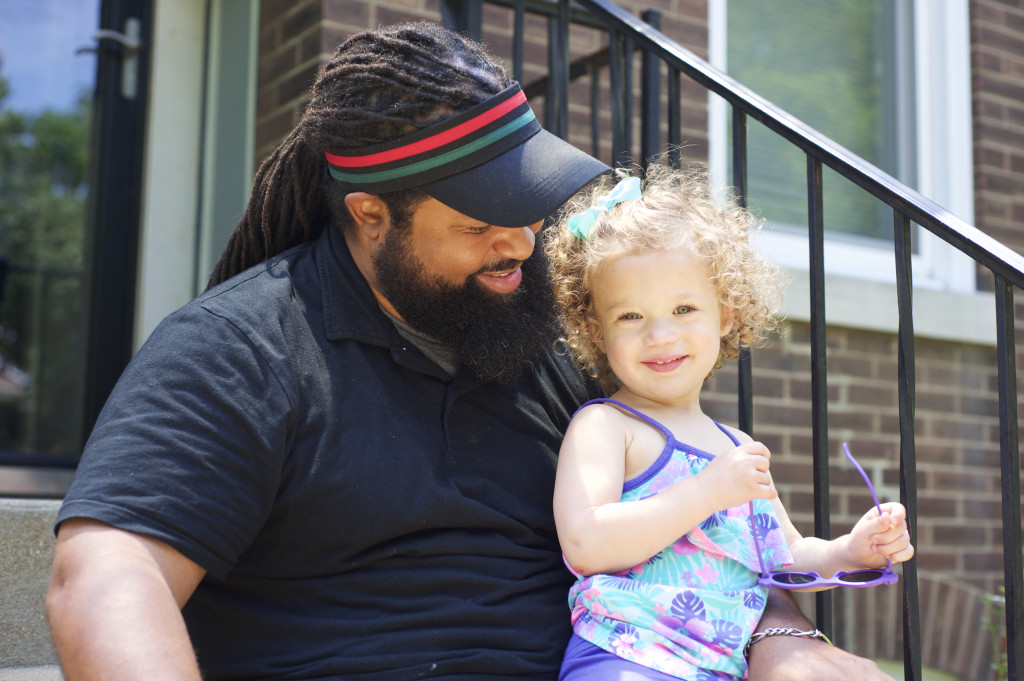
Tabari Coleman and his daughter, photos by Lindy Drew
The lowest low was when I was at the Missouri History Museum and the Chief of Police from Charlack was there and he used the phrasing “rioting” versus “protesting” about the events of the first night when the gas station was set on fire and looted. And a lot of people in the audience, they lit him up. I’m not trying to defend him, but I agree with what he said. I didn’t see that evening as peaceful protesting. Was peaceful protesting going on in parts of that community? Absolutely. Was there an element that was there creating havoc? Absolutely. Do I need to be the one defending that narrative when we know the media is already out there blasting the looting and rioting? I didn’t need to. So it was hard for me because at that moment I felt silenced. And as somebody who feels like he’s been a part of the movement in different ways, I felt like I should have been able to have a voice. I felt like I was fearful about how I would be interpreted and how my words would be interpreted if I came to his defense as a White police chief in the midst of everything that was going on. So, the lowest low wasn’t about him not being able to own his opinion. It was about me not feeling like I could support him in that moment.
A high for me will be to look back and share with my daughter that when she was a year old, her father was out there fighting for what he believed in with the NAACP where we could hopefully create a community so when she gets older she feels like she can be a part of it as a biracial child and not have to deal with some of the racial issues that are going on.
Ya know, everything that was happening in St. Louis was also happening during STL250, the 250th anniversary of the city. The Missouri History Museum did a time capsule and I wrote a note. The beauty of the Missouri History Museum is that history is happening right now. And they really do a wonderful job of capturing that. There was an opportunity for me to participate in some small way with a message to the city. So I wrote my vision — a letter to the City of St. Louis to be opened in 2064. And I wrote this letter regarding my daughter and what I expected for her 50 years from now to where, hopefully, she was living in a community that fully embraced all of the talents that diversity has brought — racial, ethnic, gender, sexual orientation — all of it. Anything that encompasses what diversity truly is. Hopefully, our city will embrace that so she can feel like she can be all of herself.
It’s hard for me because my daughter is biracial. And while society has said the one-drop rule, and all these other pieces related to who’s Black, who’s White, who’s not, I don’t get to make that decision for her. While her skin color may afford her some White privilege, it may also disadvantage her in some communities where she chooses to identify as a woman of color. Because of those pieces, I need to be mindful of making sure she has all of the richness that is a part of her mother and father. And, hopefully, we live in a world where she can step out and say, “You’re not putting me in a box. I don’t give a care if you think I’m this or that. I define me. You don’t define me.” So I do my part with the Anti-Defamation League and A World of Difference Institute by trying to create safe spaces for people to work through and process these things. But I can’t stop there, because if the world isn’t there yet when she’s making those decisions, I need to make sure she’s confident and secure in herself to make those decisions.
If I can empathize with the folks who are where they are, then we get another ally in this fight. We get another individual willing to have those conversations in their spheres of influence.
I don’t know everything I think that I know. I’m still on my journey and I’m going to be on my journey for the rest of my life. And if I can empathize with folks who are where they are, then we get another ally in this fight. We get another individual willing to have those conversations in their spheres of influence. When you asked me what I could use right now, it’s a hard answer for me because professionally I could say funding and connections and people willing to devote time and energy and effort creating space for more of our community to have these conversations in our K-12 environments, colleges, and universities. But, selfishly, I also think about what I need, and that’s the continued support of people who respect me and don’t. When I say those who don’t, I’m really talking about the people you look at and automatically don’t respect because of some stereotype.
The other day, I got pulled over and there was an automatic, “This is probably not going to be a good experience.” And it was. I got a warning, it was all good, and I went about my merry way. But those are the stories that as a Black man I need to share. And they’re few and far between. I’m not trying to start this campaign like, “Hey, everybody! I’m a Black man. I had this good experience with a White cop.” No, I’m not saying that. Unless we change the narrative, then we’re going to be caught in the cycle of us versus them. And us is also me. Because the cops are my neighbors, the cops are my family, the cops are people who live in my community who want, most of the time, the same things I want — love, happiness, validation. So if I’m only going to be talking about the time this cop did some negative shit to me, then I’m feeding into the cycle. I’m not saying don’t talk about it if it happened. But talk about everything. Talk about the moments where he let me go and he didn’t have to. That time, I appreciated that. And it’s not the first time. I’ve had some bad experiences with cops. But I’ve had some good experiences, too. Sometimes when they could have locked me up in a couple of situations, they didn’t. And I’m respectful of that. I’ll be the first one to tell somebody.
There’s value in all of us listening more. I think about empathy. I really do. If we all can relate to one another more — relate to our struggles even if you’re not disadvantaged by one of the social identities that we tend to highlight, although we all face adversity in different ways — if we could just stop for a moment and think about what that feels like, that could change things. My suggestion for someone who doesn’t play in that headspace is to create an opportunity for them to do that. Early on in my career, I wanted to teach people. If you didn’t get it, I was looking for those aha moments, those gotcha moments so I could trip you up. And what was that about? What purpose was that really serving others than to make them uncomfortable? None of that is helpful. I had to come to my own realization and recognize there’s a role for everybody in our community to do this work. I don’t do this work because I get paid to do this work. I do this work because I found an opportunity to turn my passions into a profession, to turn my thoughts into an opportunity to engage folks around critical thinking, and to live a life that allows me the comfort of knowing I’m doing the most I can each day to try to create space for people to be all of themselves.
